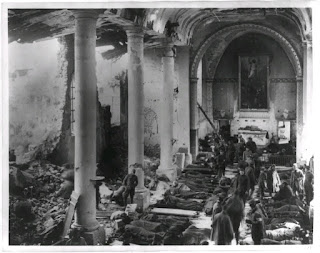Germany has promised Ukraine a field hospital, an unnerving, nearly despairing, gift for a war that hasn’t exactly begun yet, as if we can --prospectively -- bandage a war and make it better.
Germany has promised Ukraine a field hospital, an unnerving, nearly despairing, gift for a war that hasn’t exactly begun yet, as if we can --prospectively -- bandage a war and make it better.
It has been experiences in war-time hospitals that awakened many writers to some kind of pacifism, to an understanding that war inflicts injuries that are collective and deep, injuries that must be healed on a moral or spiritual level.
It was during the Crimean War, in army hospitals, that Tolstoy’s pacifism was born, a pacifism based on the understanding that war attacks truth: here, you “behold war, not. . . with music and drum-beat, with fluttering flags and galloping generals, but you behold war in its real phase—in blood, in suffering, in death.” Walt Whitman wrote of his work as an army nurse during America’s Civil War, as if that work of healing could be perpetuated by his verse: “On, on I go, (open doors of time! open hospital doors!) The crush’d head I dress, (poor crazed hand tear not the bandage away,)” Marina Tsetaeva heard the wounded of Russia’s Civil War, Red and White together, call out to her, calling out with lips and lips of wounds for, ”Mother!” Arseny Tarkovsky, lying near wounded and death during WW II, experienced a rebirth when “a strangers blood dripped into my veins,” a rebirth that gave him a new voice and language, “I was unable to recall my name, but on my tongue King David’s lexicon revived.”
In the “Hippocrates Project,” Harvard University’s School of Medicine encourages writing on medical themes, much of it by medical professionals, with the understanding that art can heal.
One of the 2013 winners was “It Will Make a Fine Hospital,” a powerful poem by a doctor who served in Iraq with Médecins Sans Frontières.
It is, of course, not a new thought to writers that poetry can inoculate against despair, the sin which may predispose us to acts of violence and to war.














Comments
Post a Comment